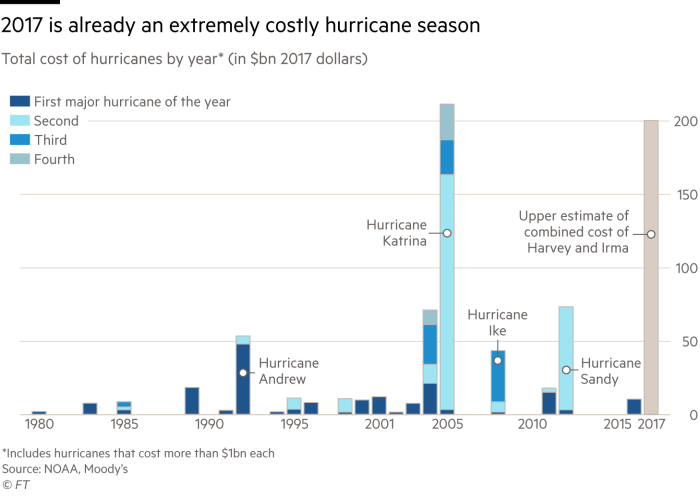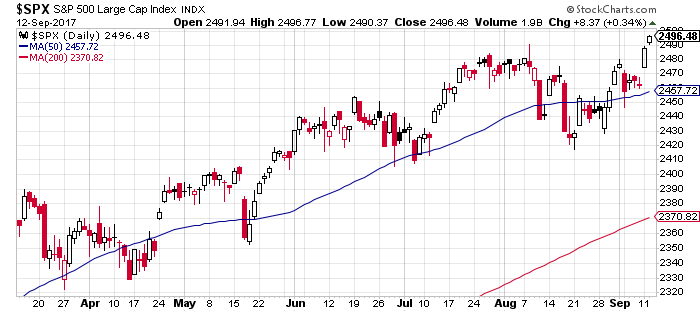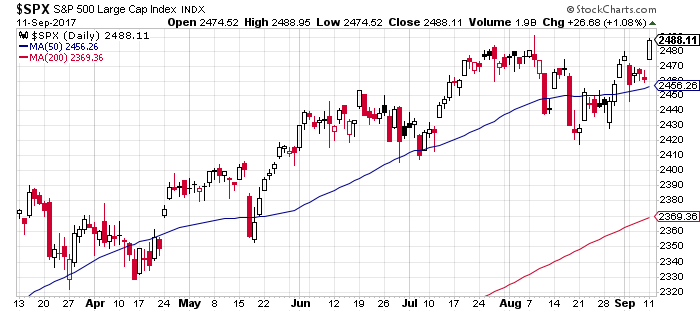Trump blocks sale of US tech company to Chinese firm, citing security: BBC
Russia’s Kasperksy Lab’s software banned from US gov’t computers: NY Times
Trump’s outreach to Democrats on tax reform is dividing GOP: Politico
US producer prices in August rise at fastest rate since January: Reuters
Another record high for the US stock market: MarketWatch
Brazil’s main stock market index hits record for 3rd session: RTT
US 2017 hurricane costs to date estimated at highest level since 2005: FT
Annual Growth Rate For US Business Lending Slips To Six-Year Low
The year-over-year growth rate for commercial and industrial loans eased to 1.6% in July, according to last week’s update by the Federal Reserve. The deceleration, the slowest pace since April 2011, looks worrisome in the eyes of some analysts.
Continue reading
Macro Briefing: 13 September 2017
US household incomes increased to record in 2016: WSJ
President Trump: New N. Korea sanctions are only the first step: Reuters
N. Korea vows faster development of nukes after new sanctions: Bloomberg
Global oil market demand set to rise faster than expected: CNBC
US small business optimism edges higher in Aug: MarketWatch
The era of no-retirement age is near: Telegraph
Another record high for US stocks as Treasuries prices fall: FT
Consumer Inflation Data Is Expected To Downplay Rate-Hike Odds
Economists expect that US inflation will remain subdued – below the Federal Reserve’s 2.0% target — in Thursday’s update on consumer prices for August. If the forecast is right, the news will continue to stoke expectations that the central bank will delay the next rate hike into next year.
Continue reading
Macro Briefing: 12 September 2017
Hurricane damage will temporarily slow US economic growth: AP
Irma’s damage expected to be less than forecast: Bloomberg
Consumer inflation outlook for year ahead holds steady at 2.5%: NY Fed
UN Security Council tightens sanctions on North Korea: NY Times
Trump considers more aggressive Iran strategy: Reuters
MSCI All Country World stock index touches record high: Reuters
US stocks (S&P 500) close at record high: Reuters
US Dollar’s Decline Fueled Gains In Foreign Bonds Last Week
The US Dollar Index last week slumped to its lowest level in over two-and-a-half years, boosting returns in foreign bonds. Non-dollar corporate bonds topped the performance list among the major asset classes, based on a set of exchange traded products. Notably, the top-four market performers for last week are offshore fixed-income funds.
Continue reading
Macro Briefing: 11 September 2017
Hurricane Irma will take a bit out of Florida’s economy: CNN Money
Will global warming increase hurricane risk? Bloomberg
Inflation in China rises to fastest pace since Jan: RTT
Will oil rebound to $80/bbl? Fuhgettaboutit: Oil.com
GDPNow’s US Q3 GDP forecast ticks up to 3.0%: Atlanta Fed
NY Fed US Q3 GDP now cast eases to 2.1%: NY Fed
US Dollar Index fell to lowest since Jan 2015 last week: CNBC
US Business Cycle Risk Report Update For Sep. 10, 2017
The Sep. 10 edition of The US Business Cycle Risk Report has been published and emailed to subscribers.
Book Bits | 9 September 2017
● The Myth of Independence: How Congress Governs the Federal Reserve
By Sarah Binder and Mark Spindel
Review via Publishers Weekly
Binder and Spindel have written an extremely thorough study of the Federal Reserve that shows how the institution, while in theory insulated from politics, is in reality anything but. Binder and Spindel persuasively argue that Congress and the Federal Reserve are interdependent entities. By giving the Fed the power to control monetary policy and steer the economy, lawmakers gain their own convenient scapegoat when the economy sours. Likewise, the Fed relies on Congress for political support to implement “unpopular but necessary” policies.
Continue reading
A New Sample Issue: The US Business Cycle Risk Report
Curious about the newsletter? You’re timing is perfect. Here’s a fresh sample of The US Business Cycle Risk Report.
Even better, there’s a weekend bonus: Subscribe for one year by Sunday, Sep. 10, 2017 and you’ll receive 5 additional issues at no extra charge.
For complete subscription information, click here.




